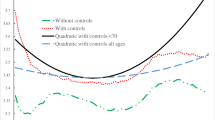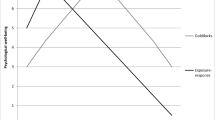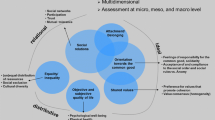Abstract
In the last decade, a lively interdisciplinary discussion has grown around the evidence that, in the long-run, people’s subjective well-being is not significantly correlated with income growth. In other words, GDP growth does not predict the long run growth of subjective well-being. In this paper, we argue that there exists a different predictor of subjective well-being that works pretty well: sociability, i.e. the quality and quantity of social relationships (also referred to as relational goods). More precisely, we illustrate the role of sociability as a predictor of well-being, presenting the available evidence at both the within-country and the worldwide level. In particular, we discuss recent evidence from US cross-sectional data (General Social Survey, 1975–2004), cross-country time series (World Value Survey 1980–2005), and German panel data (German Socio-Economic Panel, 1996–2007). We conclude by indicating the most relevant open issues and suggesting future lines of research.






Similar content being viewed by others
Notes
Besides the role of income aspirations, SWB data have been used to investigate the inflation-unemployment trade-off (Di Tella et al. 2001, 2003), the role of political institutions (Frey and Stutzer 2000), the impact of environmental pollution (Welsch 2006, 2007; Ferrer-i-Carbonell and Gowdy 2007), the costs of unemployment (Clark and Oswald 1994), inequality (Alesina et al. 2004; Graham and Pettinato 2002; see also Frey and Stutzer 2002). However, as indicated by Di Tella and MacCulloch (2008), adding these other sources of variation does not allow us to provide good predictions of SWB trends.
In a recent paper Stanca (2009) proposes a new method to measure the quality of relational life which builds on the evidence that better relational life goes with a higher SWB.
References
Alesina A, Di Tella R, MacCulloch RT (2004) Inequality and happiness: are Europeans and Americans different? J Public Econ 88(9–10):2009–2042
Antoci A, Sacco PL, Vanin P (2007) Social capital accumulation and the evolution of social participation. J Socio-Econ 36(1):128–143
Bartolini S, Bonatti L (2008) Endogenous growth, decline in social capital and expansion of market activities. J Econ Behav Organ 67(3):917–926
Bartolini S, Bilancini E, Pugno M (2008) American declines of social capital and happiness: is there any linkage? Mimeo, University of Siena
Bartolini S, Bilancini E, Sarracino F (2009a) Social capital predicts happiness in nations: world-wide evidence from time series, Quaderno del dipartimento di Economia Politica n.579, University of Siena
Bartolini S, Bilancini E, Sarracino F (2009b) Predicting the trend of well-being in Germany: how much do comparisons, adaptation and sociability matter? Mimeo, University of Siena
Becchetti L, Pelloni A, Rossetti F (2008) Relational goods, sociability and happiness. Kyklos 61(3):343–363
Becchetti L, Giachin Ricca E, Pelloni A (2009) The 60es turnaround as a test on the causal relationship between sociability and happiness. Econometica. Working papers wp07, Econometica
Benabou R, Tirole J (2003) Intrinsic and extrinsic motivation. Review of Economic Studies, Blackwell Publishing 70(3):489–520, 07
Blanchflower DG, Oswald AJ (2004) Well-being over time in Britain and the USA. J Public Econ, Elsevier, 88(7–8):1359–1386
Bruni L, Porta PL (eds) (2007) Handbook on the economics of happiness. Edward Elgar, Cheltenham, pp 185–208
Bruni L, Stanca L (2008) Watching alone. Happiness, relational goods and television. J Econ Behav Organ 65(3–4):506–528
Clark A, Oswald A (1994) Unhappiness and unemployment. Econ J 104:648–659
Clark AE, Frijters P, Shields MA (2008) Relative income, happiness, and utility: an explanation for the Easterlin Paradox and other puzzles. J Econ Literature 46(1):95–144
Costa DL, Kahn ME (2003) Understanding the decline in social capital, 1952–1998. Kyklos 56:17–46
Deci EL (1971) Effects of externally mediated rewards on intrinsic motivation. J Pers Soc Psychol 18:105–115
Di Tella R, MacCulloch RJ, Oswald AJ (2001) Preferences over inflation and unemployment: evidence from surveys of happiness. Am Econ Rev 91(1):335–341
Di Tella R, MacCulloch RJ, Oswald AJ (2003) The macroeconomics of happiness vol 85, issue 4. The Review of Economics and Statistics, MIT Press, Cambridge, pp 809–827, 09
Di Tella R, MacCulloch R (2008) Gross national happiness as an answer to the Easterlin Paradox? J Development Econ, Elsevier, 86(1):22–42
Duesenberry JS (1949) Income, savings and the theory of consumer behaviour. Harvard University Press, Cambridge
Easterlin RA (1974) Does economic growth improve the human lot? Some empirical evidence. In: David PA, Melvin WR (eds) Nations and households in economic growth. Stanford University Press, Palo Alto, pp 98–125
Easterlin RA (1995) Will raising the incomes of all increase the happiness of all? J Econ Behav Organ 27(1):35–47
Easterlin RA, Angelescu L (2009) Happiness and growth the world over: time series evidence on the happiness-income Paradox, IZA DP no. 4060
Ferrer-i-Carbonell A, Frijters P (2004) How important is methodology for the estimates of the determinants of happiness? Econ J 114:641–659
Ferrer-i-Carbonell A, Gowdy JM (2007) Environmental degradation and happiness. Ecol Econ 60(3):509–516
Frederick S, Loewenstein G (1999) Hedonic adaptation. In: Kanheman D, Diener E (eds) The foundations of hedonic psychology. Russel Sage Foundation, New York
Frey B, Stutzer A (2000) Happiness, economy and institutions. Econ J 110(466):918–938
Frey B, Stutzer A (2002) What can economists learn from happiness research? J Econ Lit XL(2):402–435
Frey BS (1997) A constitution for knaves crowds out civic virtues. Econ J 107(443):1043–1053
Frey BS, Jegen R (2001) Motivational crowding out: a survey of empirical evidence. J Econ Surv 15:589–611
Graham C, Pettinato S (2002) Happiness and hardship: opportunity and insecurity in new market economies. The Brookings Institution, NW, Washington
Gui B (1987) Eléments pour une définition d’ « économie communautaire». Notes et Documents 19–20:32–42
Gui B (2000) Beyond transactions: on the interpersonal dimension of economic reality. Annal Public Cooper Econ 71(2):139–169
Gui B, Sugden. R (2005) Economics and social interaction. Cambridge University Press, Cambridge
Helliwell JF (2006) Well-being, social capital and public policy: what’s new? Econ J 116(510):C34–C45
Helliwell JF (2007) Well-being and social capital: does suicide pose a puzzle? Soc Indic Res 81:455–496
Helliwell JF, Huang H (2007) Well-being and trust in the workplace, NBER wp 14589
Helliwell JF, Putnam RD (2005) The social context of well-being. Phil Trans, 359(1449):1435–1446. Reprinted in: Huppert FA, Kaverne B, Baylis N (eds) The science of well-being. Oxford University Press, London
Helliwell JF, Barrington-Leigh CP, Harris A, Huang H (2009) International evidence on the social context of well-being. In: Kahneman D, Diener E, Helliwell J (eds) International differences in well-being. Oxford University Press, Oxford
Inglehart RF (2009) Faith and freedom: traditional and modern ways to happiness. In: Kahneman D, Diener E, Helliwell J (eds) International differences in well-being. Oxford University Press, Oxford
Kahneman D, Diener E (eds) (1999) The foundations of hedonic psychology. Russel Sage Foundation, New York
Kreps DM (1997) Intrinsic motivation and extrinsic incentives. Am Econ Rev 87(2):359–364
Layard R (2005) Happiness. Lessons from a new science. Allen Lane, London
Lim C, Putnam R (2008) Praying alone is no fun: religion, social networks and subjective well-being. Mimeo, 2009
McPherson M, Smith-Lovin L, Brashears ME (2006) Social isolation in America: changes in core discussion networks over two decades. Am Sociol Rev 71:353–375
Powdthavee N (2008) Putting a price tag on friends, relatives, and neighbours: using surveys of life satisfaction to value social relationships. J Socio-Econ 37(4):1459–1480
Putnam RD (2000) Bowling alone. The collapse and revival of American Community. Simon & Schuster, NY
Ryan RM, Deci EL (2001) On happiness and human potential: a review of research on hedonic and eudaimonic well-being. Annu Rev Psychol 52:141–166
Sabatini Fabio (2009) Social capital as social networks: a new framework for measurement and an empirical analysis of its determinants and consequences. J Socio-Econ 38(3):429–442
Sarracino F (2009) Social capital and subjective well-being trends: evidence from 11 European country. J Socio-Econ. doi:10.1016/j.socec2009.10.010
Stanca L (2009) With or without you: measuring the quality of relational life throughout theworld” (2009). J Socio-Econ 38:834–842
Stevenson B, Wolfers J (2008) Economic growth and subjective well-being: reassessing the Easterlin Paradox. Brookings Papers on Economic Activity
Stevenson B, Wolfers J (2009) The Paradox of declining female happiness. Am Econ J: Econ Policy 1(2):190–225
Stutzer A (2004) The role of income aspirations in individual happiness. J Econ Behav Organ 54(1):89–109
Uhlaner CJ (1989) Relational goods and participation: incorporating sociability into a theory of rational action. Public Choice, vol 62, no 3
Van Landeghem BGM (2008) Human well-being over the life cycle: longitudinal evidence from a 20-year panel. LICOS Centre for Institutions and Economic Performance, Discussion Paper 213/2008
Veblen T (1899) The theory of the leisure class. Macmillan, New York
Welsch H (2006) Environment and happiness: valuation of air pollution using life satisfaction data. Ecol Econ 58(4):801–813
Welsch H (2007) Environmental welfare analysis: a life satisfaction approach. Ecol Econ 62(3–4):544–551
Acknowledgments
We would like to thank Benedetto Gui for his valuable comments and suggestions. A special thanks goes to the participants to the 2009 Conference on “Happiness and Relational Goods”, who have enthusiastically contributed to bring fresh and new ideas on our research. We also acknowledge the work of our co-authors Francesco Sarracino and Maurizio Pugno, which is extensively reported in this paper.
Author information
Authors and Affiliations
Corresponding author
Rights and permissions
About this article
Cite this article
Bartolini, S., Bilancini, E. If not only GDP, what else? Using relational goods to predict the trends of subjective well-being. Int Rev Econ 57, 199–213 (2010). https://doi.org/10.1007/s12232-010-0098-1
Published:
Issue Date:
DOI: https://doi.org/10.1007/s12232-010-0098-1
Keywords
- Happiness
- Social capital
- Economic growth
- Relational goods
- Intrinsic motivations
- Subjective well-being
- Easterlin paradox
- Life satisfaction
- Sociability




